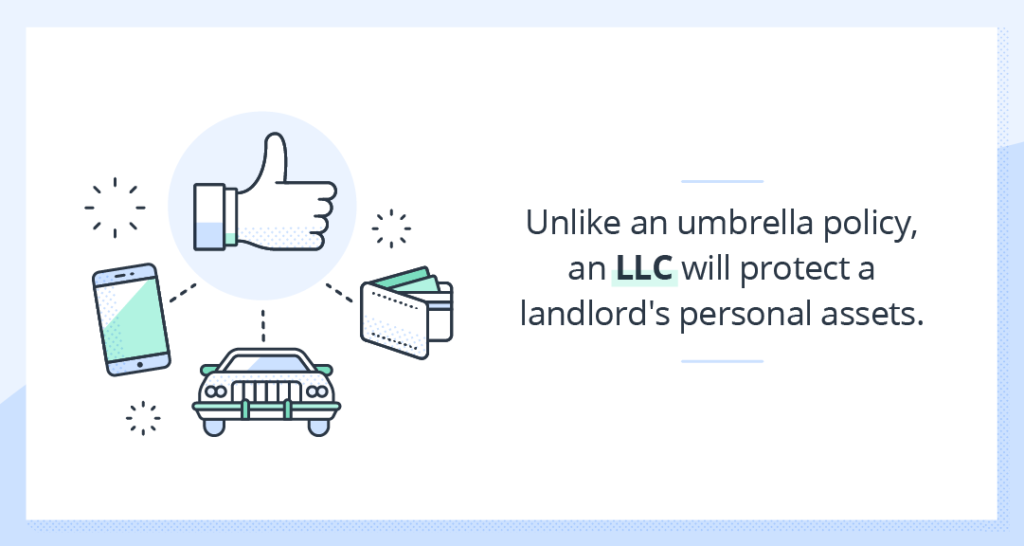12 min read
Beyond Traditional Loans: 14 Creative Financing Options for Real Estate Investing
Creative financing can offer real estate investors options beyond traditional lending from banks. If you have less-than-ideal credit or lack a sizeable...

A landlord’s top priority is to protect their investment. A positive return on that investment is directly related to having a functioning rental, with high-quality tenants. However, unexpected natural disasters, or tenant claims arise, so being properly insured is an essential part of protecting the long-term financial success of a rental property. Most homeowners policies likely won’t cover a rental property, and if there is a mortgage on the rental, banks will likely require a separate policy. Most landlords will purchase a landlord liability policy, which will help protect them from potential tenant lawsuits.
What does landlord liability insurance cover? While policies and coverage will vary, it will likely cover a claim made by a tenant where the landlord was perceived as the responsible party, and may have failed in maintaining the safety of the property. For example, if a tenant tripped on the door jam when exiting their apartment and broke their toe, they may file a claim stating that the landlord failed to properly maintain the rental.
Usually a standard landlord policy would cover the claim if the landlord was found negligent. However, there are some circumstances and events that may max out the coverage on your landlord liability insurance, often an umbrella policy can pick up the rest, and it is an affordable way to cover your assets. We will discuss the ins and outs of both landlord liability insurance and umbrella insurance to help you decide on the best insurance options for your investment.
Umbrella Insurance is designed to add extra liability insurance over and above another insurance policy. Just like the name, umbrella insurance “hangs over” the standard insurance like an umbrella. Umbrella insurance offers further protection against property damage, incidents/injuries involving non-household members that occur at a home, libel/slander, malicious prosecution, landlord liability and business liability.
In the unfortunate event a tenant makes a claim and the landlord is found responsible, if the incident is covered by the landlord’s liability insurance, that plan will make the initial claim payout. If the payout is more than the plan offers, or is outside of what is covered, that is when the umbrella insurance will usually kick in.
According to the Insurance Information Institute, a $1 million umbrella insurance policy will cost between $150 and $500 per year. Usually umbrella insurance policies have minimum requirements that must be met as well. For example, a landlord can’t have a bare minimum liability policy and then a more affordable umbrella policy. They must have another insurance policy the umbrella insurance covers, if they don’t, they may be required to purchase a stand-alone umbrella policy, with its own defined coverage and premiums.
A landlord’s best bet will be to find an insurance company that offers both landlord liability insurance as well as umbrella insurance. Each landlords coverage, deductible, and premium will vary depending on needs and assets. So sitting down with a qualified professional who can customize a policy and plan is the best plan of action.
Often insurance companies will offer discounts for bundling policies as well, which can help to lower your overall insurance costs. It’s also important to remember that a policy with a low annual premium may have a high deductible. If a landlord lost a lawsuit, they would be required to pay that deductible before the plan will pay out.
A common question among landlords is whether they should purchase an umbrella insurance policy or form an LLC. While there aren’t any hard and fast rules, here is the breakdown of each one to help narrow in on the best decision for your business.

An LLC is a limited liability company. One of the main reasons people set up an LLC is to protect their personal assets. Owners of LLCs are called members, and each state has different filing rules, regulations and fees. LLCs do not cross state lines, so if a landlord has properties in multiple states, they will need to register for an LLC in each state where their properties are. There are countless tools to help you form an LLC, even if you don’t have prior experience.
As stated above, an LLC will protect a landlord’s personal assets. So, for example, if a tenant were to injure themselves at a landlord’s property, the insurance company would pay the maximum amount towards the claim that the policy allows, if that didn’t cover the entire claim, the company’s assets, not the landlord’s personal assets would be responsible for the rest of the payout.
While an LLC will provide a layer of protection personally, the LLC’s assets are still at risk if a lawsuit were filed against it. When determining whether an LLC or an umbrella policy is a better option, a landlord must assess the potential risk. Consider this example. A tenant falls down a flight of stairs and breaks their leg. The tenant decides to sue the landlord for medical expenses and the insurance company decides to settle and pays out the maximum amount allowed by the plan, but it doesn’t cover the entire amount.
If the landlord’s property was an LLC the company would then be responsible for the remainder of the settlement. However, if the landlord carried an umbrella policy that would kick in once the liability policy max was met. The landlord would be responsible for the deductible on the umbrella policy plan, and then that plan would pay the remainder of the claim, up to its max payout on a covered event.
Yes, it also covers personal circumstances such as slander and libel.
Yes, both umbrella policies and LLC’s are tax deductible.
Umbrella policies do not cover punitive damages or your own personal injuries. Umbrella policies do not cover personal expenses.
Assets will vary from landlord to landlord. So inevitably the type and amount of insurance coverage will vary as well. Determining what will work best to ensure that your assets, both personally and professionally, are covered, takes an honest assessment balanced with enough coverage to keep you protected and financially secure. Umbrella insurance might be a good option. In addition, landlords should be sure to screen tenants once their leads have filled out a rental application to make sure they are a good fit beforehand.
DISCLAIMER: TurboTenant, Inc does not provide legal advice. This material has been prepared for informational purposes only. All users are advised to check all applicable local, state and federal laws and consult legal counsel should questions arise.
12 min read
Creative financing can offer real estate investors options beyond traditional lending from banks. If you have less-than-ideal credit or lack a sizeable...
11 min read
If you came here wondering how to write a lease agreement, look no further. Creating iron-clad rental contracts is essential for protecting the rights...
10 min read
Between the risks of running a business, a volatile and ever-changing real estate market, and the sometimes fickle attitudes of the renting...
Join the 700,000+ independent landlords who rely on TurboTenant to create welcoming rental experiences.
No tricks or trials to worry about. So what’s the harm? Try it today!
TurboTenant, Inc., © 2025
Created in Sunny Colorado